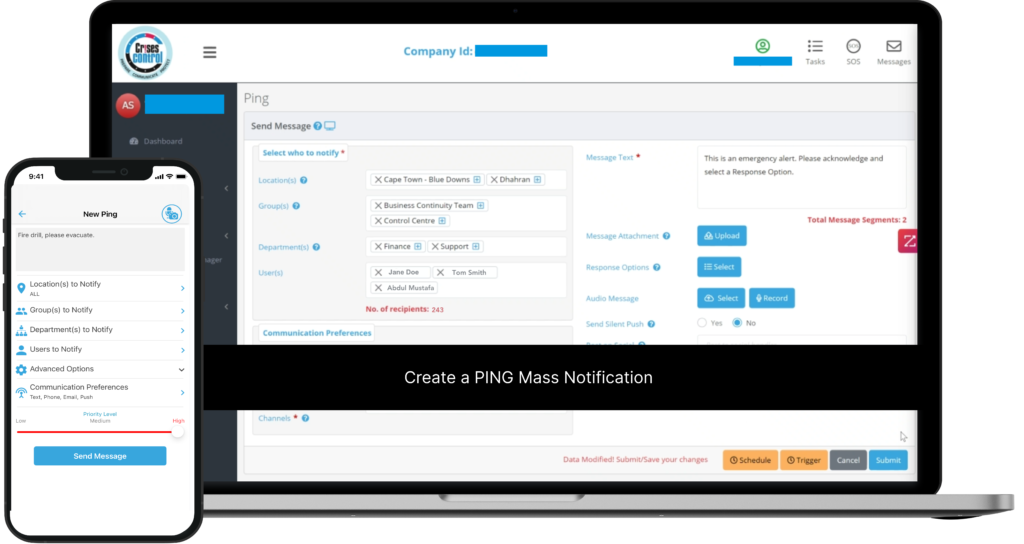Written by Ikram Tassi | Marketing
When a crisis strikes, communication isn’t just important—it’s everything. Whether it’s a natural disaster, a cyberattack, or an unexpected operational failure, your team’s ability to respond swiftly and effectively depends on how well you communicate. In such moments, relying on traditional tools like email chains or scattered messaging apps simply won’t suffice.
Enter Mass Notification Software—a transformative solution that ensures critical information reaches the right people at the right time, no matter where they are. In this blog, we’ll delve into how mass notification systems revolutionise crisis communication and explore how Crises Control provides the tools you need to navigate emergencies with confidence.
The Hidden Costs of Poor Crisis Communication
It’s easy to overlook how quickly poor communication can escalate a manageable situation into a full-blown disaster. Consider the following scenarios:
- Missed Alerts: A regional manager misses an email about an approaching storm, failing to shut down operations in time and putting employees at risk.
- Overloaded Channels: Teams lose valuable time sifting through long chat threads to decipher what’s happening and what actions to take.
- Conflicting Instructions: One department tells staff to evacuate while another advises staying put, leading to confusion and panic.
- Delayed Responses: Without a clear feedback loop, leadership remains in the dark about whether instructions have been followed or additional actions are needed.
These gaps in communication can lead to financial losses, reputational damage, and, most critically, threats to employee safety. The answer lies in implementing a fast, reliable, and crisis-ready system.
What is Mass Notification Software?
Mass notification software is a platform designed to deliver urgent messages quickly and efficiently to specific groups of people via multiple channels—think SMS, email, app notifications, and voice calls.
But it’s more than just a messaging tool. This software ensures messages are received, understood, and acted upon. The most effective systems, like Crises Control, feature advanced capabilities such as real-time tracking, two-way communication, and automated workflows tailored to specific crises.
The Unique Advantages of Mass Notification Software
1. Instant Communication Without Delay
In a crisis, every second counts. Mass notification software cuts through the noise, delivering urgent messages instantly to those who need them. This is essential for situations such as:
- Weather Warnings: Informing teams of storms, heatwaves, or flooding.
- IT Disruptions: Notifying staff and customers of a system outage before it impacts operations.
2. Ensuring Consistency Across Teams
Mass notification systems deliver a single, unified message to all relevant parties, eliminating the risk of conflicting instructions. For example, if an office fire occurs, staff receive simultaneous evacuation instructions, while leadership gets real-time updates on building conditions.
3. Actionable Feedback Loops
Communication isn’t just about broadcasting information; it’s about listening too. Advanced systems enable recipients to confirm they’ve received alerts or share their status. This real-time feedback helps decision-makers understand who needs further assistance or additional instructions.
4. Scalable to Any Crisis
Whether you’re managing a small office or a global workforce, mass notification software adapts to meet your needs. Solutions like Crises Control allow you to:
- Send regional alerts for localised issues.
- Push global notifications during company-wide crises.
- Translate messages into multiple languages automatically.
Why Mass Notification Software is Essential for Crisis Communication
Mass notification software strengthens your crisis response strategy in several ways:
- Clarity in Chaos: Delivers clear, actionable messages that reduce panic and confusion.
- Speedy Decisions: Automates workflows for common crises, saving precious minutes.
- Improved Accountability: Tracks message delivery and responses in real-time, ensuring no one is overlooked.
- Business Continuity: Keeps employees informed, minimising disruptions and helping operations run smoothly.
Interested in our Ping Mass Notification System?
Efficiently alert everyone in seconds at scale with our Mass Notification System – PING, get the message out fast and ensure rapid response and recovery.

How Crises Control Delivers Excellence in Crisis Management
At Crises Control, we understand the unique challenges businesses face during crises. That’s why we’ve designed a platform that’s flexible, intuitive, and equipped with cutting-edge features.
1. Multi-Channel Communication
Our platform ensures your message reaches everyone, regardless of their preferred communication channel. Whether it’s SMS, email, app notifications, or voice calls, Crises Control guarantees seamless delivery.
2. Pre-Configured Workflows for Rapid Action
Emergencies demand swift action, and Crises Control helps you stay prepared with pre-built workflows for various scenarios. For example, you can set up automated alerts for:
- Fire evacuations.
- Cybersecurity breaches.
- Supply chain disruptions.
3. Real-Time Tracking and Insights
Our tracking dashboard provides instant visibility into who has received your alerts and how they’ve responded. This is crucial for identifying gaps and ensuring every team member is accounted for.
4. Global and Multilingual Capabilities
Operating across multiple countries? Crises Control supports multilingual messaging and accommodates different time zones, keeping global teams connected.
5. Analytics for Continuous Improvement
Post-crisis, our analytics tools allow you to review how effectively the situation was handled. Use these insights to refine your strategies for even better results in the future.
Steps to Implement Mass Notification Software
If you’re ready to improve your crisis communication, here’s how to get started:
- Identify Key Scenarios
Outline the most common crises your organisation faces, such as severe weather, cybersecurity incidents, or facility evacuations. - Evaluate Communication Gaps
Assess your current tools to identify weaknesses, such as delays in reaching staff or inconsistent messaging. - Choose the Right Solution
Look for a platform that offers flexibility, scalability, and features like real-time tracking. Crises Control provides all this and more. - Train Your Team
Ensure employees are familiar with the system and understand their roles during a crisis. - Test Regularly
Conduct routine drills to test the system and refine workflows.
Don’t Wait Until It’s Too Late—Get Prepared with Crises Control
Emergencies don’t wait, and neither should you. By investing in Mass Notification Software, you’re taking a proactive step to safeguard your employees, maintain business continuity, and strengthen your crisis response.
At Crises Control, we’re here to support you every step of the way. Our platform combines ease of use with powerful features to ensure you’re ready for whatever challenges arise.
Don’t let a crisis catch you off guard. Contact us to schedule your free demo and discover how Crises Control can transform your approach to crisis communication.
With Crises Control, you’re not just responding to emergencies—you’re mastering them.
Request a FREE Demo

